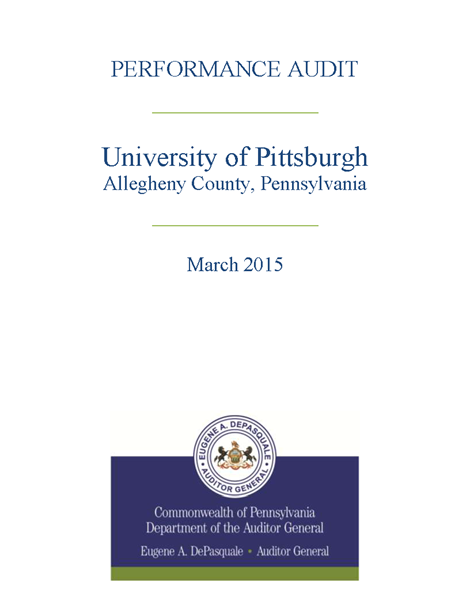Auditor General DePasquale Says University of Pittsburgh Strengthened Its Oversight for Youth Camps

Auditor General DePasquale Says University of Pittsburgh Strengthened Its Oversight for Youth Camps
PITTSBURGH (March 5, 2015) – Auditor General Eugene DePasquale today said his latest audit shows the University of Pittsburgh strengthened its procedures to require and verify criminal background checks and child abuse clearances for all outside coaches, staff and volunteers who use the university’s facilities for youth sports and education camps.
The changes began in 2012 when the university required special events contracts where the coaches and academic sponsors were responsible for all coaches, staff and volunteers to have criminal background checks and child abuse clearances.
In May 2014, the university began reviewing internally if the background checks were being completed on all adults who came into contact with minors at camps held on university campuses.
“Today, many parents should be pleased to learn that the university took the extra steps to strengthen its policies and oversight for young people attending sports and education camps on their campuses,” DePasquale said.
“I applaud the university’s leadership for taking the initiative and implementing changes while we were still conducting the audit, instead of waiting until the final audit was complete,” DePasquale said. “The changes were needed and necessary.”
The audit covered July 1, 2010 to June 30, 2013. Auditors found that parents could be under the impression these camps were sponsored by the university, at least in part, because the university’s logo was used on camp brochures and websites.
Until the recent changes in May 2014, university officials relied on the coaches who ran the camps to obtain the proper background checks because the coaches serve as independent contractors.
In an 18-month period from January 2012 to June 2013, there were 61 youth athletic camps. The university required the coaches to sign a special events contract, saying the coaches were responsible for all background checks, but the university did not verify or review the information.
Auditors tried to review eight athletic camps. Of the eight camps, only six of the coaches provided a list of employees and volunteers. In those six camps, the coaches failed to obtain 91 of the required 390 criminal, child abuse and federal background checks for the 130 staff members and volunteers at these six camps.
In a review of five different education camps, the academic sponsors failed to obtain 90 of 261 required background checks for 87 volunteers and staff. In one case, at a health camp held in 2010, none of the 16 staff and volunteers had the proper clearances. In another case, the administrator for an engineering camp destroyed the clearance files, a violation of university policy that the copies must be maintained by Human Resources.
“Thankfully, university leaders recognized it needed to do more to ensure the safety and welfare of young visitors to its campuses,” DePasquale said.
The University of Pittsburgh received $144.3 million in state appropriations in 2013 for its campuses here and in Johnstown, Greensburg, Titusville and Bradford.
Besides the two findings on background checks for athletic and educational camps, there were six other findings in the audit, including:
• The university’s controls were inadequate to ensure that procurement card transactions and approvals complied with university policy.
o Auditors tested 25 of 510 cards with charges over $5,000 and found that 59 of 208 purchases on those cards (28 percent of transactions) valued at $45,457, violated university policy.
o One cardholder made $2,642 in purchases for personal use. The cardholder was terminated for fraud. None of the purchases included receipts.
o Three cardholders did not maintain receipts for 11 purchases worth $3,825. One cardholder purchased items for a holiday party, a violation of university policy.
o One cardholder split a $13,379 purchase into multiple transactions to bypass a $2,000 single transaction limit. The cardholder’s privileges were revoked.
• University departments implemented internal audit recommendations in a timely manner.
• Due to limitations imposed by the university because of confidentiality concerns, auditors were unable to determine if AlertLine reports were properly categorized, prioritized, investigated and resolved.
• The University complied with NCAA bylaws for 30 student-athletes regarding eligibility and financial aid.
o Twenty-six of the 30 student-athletes met minimum 1.8 grade point averages permitted by the NCAA. The other four were freshman and not required to meet a minimum GPA.
• The university did not adequately justify a direct source contract and did not always document that prices paid for directed or sole source contracts were fair and reasonable.
o Of the 19 contracts reviewed, three were competitively bid; six were sole source; seven were direct service contracts.
• The university did not consistently ensure all payments to vendors were made in accordance with contract terms.
o In a review of eight invoices from one vendor on a single contract, the university overpaid $2,898.
The University of Pittsburgh audit report is available online here.
# # #
Return to search results